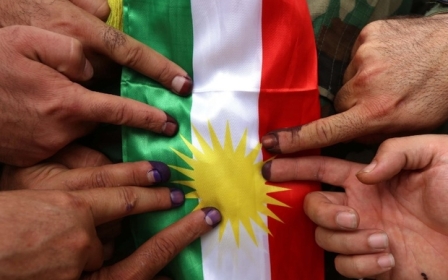Iraqi PM announces 24-hour halt in fighting with Kurdish forces

Iraqi Prime Minister Haider al-Abadi on Friday announced "a halt to movements by the armed forces for 24 hours" in zones disputed by Baghdad and the autonomous Kurdish region.
Abadi, who also heads the armed forces, said the pause aimed to "give the opportunity to a joint technical committee of the federal authorities and those of Kurdistan to work on deploying federal forces in all of the disputed zones" in northern Iraq.
The announcement comes after Iraqi forces set a tight deadline on Friday for Kurdish fighters to withdraw from an area on the Turkish border that is critical for oil exports.
A senior government security source, asking not to be named, said Kurdish Peshmerga fighters were being given "a few hours" to pull out of the area around the Fishkhabur border post.
Clashes between the two sides had ceased "with only occasional exchanges of fire," said the source.
A spokesperson for the US-led anti-Islamic State (IS) group coalition in Iraq caused confusion earlier after confirming and then denying that a ceasefire had been made.
Army Colonel Ryan Dillon, spokesman for Operation Inherent Resolve (OIR), had earlier said that Iraqi forces and Kurdish Peshmerga fighters reached an agreement on Friday to stop fighting in northern Iraq.
However, he later tweeted that he had been mistaken.
"I incorrectly said in interview today with [Rudaw] there was a 'ceasefire' b/w Iraqi and Kurdish forces," he tweeted.
"Both parties talking w/ one another, but not an official “ceasefire.” [OIR] encouraging dialogue w/o further conflict."
Iraqi forces on Thursday mounted a new assault on Kurdish fighters in the disputed oil-rich Zummar area of Nineveh province, triggering heavy artillery exchanges.
In an advance over dusty terrain with armoured vehicles, government forces recaptured villages close to the route of a strategic oil export pipeline linking the Kirkuk fields retaken from the Kurds earlier this month with the Turkish port of Ceyhan.
The Kurds shut down the pipeline during the 2014 sweep through northern and western Iraq by the Islamic State (IS) militant group and built their own pipeline further north.
The Fishkhabur region, at the extreme edge of autonomous Iraqi Kurdistan and where the Turkish, Iraqi and Syrian borders converge, is of strategic importance to both Baghdad and the Kurds of northern Iraq.
The Kurds have been defending the Zummar and Rabiya areas of Fishkhabur because they are used by Kurdish forces battling IS in Syria to smuggle out fuel products by tanker trucks to Turkey, according to the Iraqi source.
Nicholas Heras, analyst at the Centre for a New American Security, told the Washington Post that the fall of the border crossing to Iraq forces could prove a damaging blow to US policy in Syria.
“Fishkhabur is more than just a border gate: it is the essential doorway for long-term American influence in Syria," he said.
"And Iran wants to slam that gate shut.”
Forces belonging to the heavily Iran-backed Popular Mobilisation Units (PMUs) have been involved in the fighting in Fishkhabur, according to Kurdish spokespeople.
In a statement released on Thursday, the Kurdistan Regional Government (KRG) called on the international community to intervene to end the escalation, particularly noting that Iraqi forces were using US-supplied equipment.
"Their continued deployment and use of heavy equipment signals intent to use military means to settle political disputes," it read.
"This behaviour continues because the US-led global coalition fails to apply the pressure necessary to stop Iraq's aggressive military attacks."
The UN Security Council on Thursday urged Iraq's government and Kurdish leaders to set a timetable for talks on ending their conflict triggered by a 25 September independence referendum held by the Kurds in defiance of Baghdad.
On Thursday, US Secretary of State Rex Tillerson said he was "disappointed that the parties have been unable to reach an entirely peaceful resolution," speaking to reporters in Geneva.
New MEE newsletter: Jerusalem Dispatch
Sign up to get the latest insights and analysis on Israel-Palestine, alongside Turkey Unpacked and other MEE newsletters
Middle East Eye delivers independent and unrivalled coverage and analysis of the Middle East, North Africa and beyond. To learn more about republishing this content and the associated fees, please fill out this form. More about MEE can be found here.




